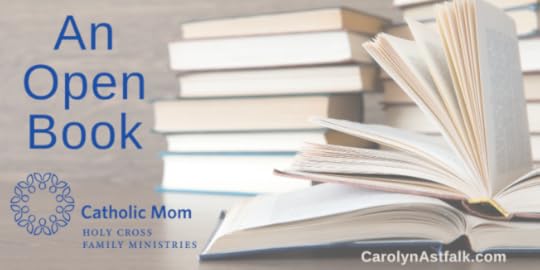An Open Book October

Today, I’m joining Carolyn Astfalk and Catholic Mom for An Open Book. Here’s what I’ve been reading and/or working on for the past month:

A Very Loud Christmas by Amy Shisler and Emily Torres
Synopsis: Meet Crash, Belle, Carol, Thor, and Joy, the Loud children. They love to laugh and sing and enjoy life – loudly! The rest of the families in their quiet, mountain village don’t understand why the Loud children are always so loud, and the other children are not allowed to play with them. One Christmas, little Johnny Thompson gets lost in the woods, and the village must rely on the very Loud family to bring Johnny home. This delightful book will enchant children with its illustrations and lovable, often relatable, characters and will warm the hearts of parents with its valuable lessons on acceptance, friendship, and prayer. It’s the perfect gift at Christmas or any time of the year.
My review: This is a delightfully written and illustrated children’s book that I read to all three of my grandchildren (ages six, three, and eighteen months old). The only one who sat still enough to listen to the story was my oldest grandchild, who is six years old. He wondered, “Why won’t the people talk to the Loud kids just because they’re loud? That’s not very nice.”
I wasn’t exactly sure of the reason, although I can tell you that all four of my grandchildren happen to be loud. Yes, there are times when it’s good to be noisy and other times when perhaps it’s not so good.
When I asked my grandson what he thought of the book, he said, “I like it. I especially liked it when the Loud family saved the boy, and then everybody started talking to them. And I really liked the names of the kids.” This is an excellent resource to help children understand that being loud sometimes has its advantages. As an adult, I enjoyed the story and the illustrations, and I highly recommend this book to parents, not just at Christmas time, but throughout the year.

The Pre Persons by Philip K. Dick
Synopsis: “The Pre-persons” is a science fiction short story by Philip K. Dick. It was first published in The Magazine of Fantasy and Science Fiction, October 1974, and was a pro-life response to Roe v. Wade. Dick imagines a future where the United States Congress has decided that abortion is legal until the soul enters the body, which is specified as the moment a person has the ability to do simple algebra (around the age of 12). The main protester — a former Stanford mathematics major — demands to be taken to the abortion center, since he claims to have forgotten all his algebra.
My review: This is an outstanding story, and some of what the author wrote about is actually happening nowadays, i.e., abortion up to the moment of birth. It has an abysmal rating on Goodreads, I suspect, because pro-choice people don’t like the message. Highly recommend.

Whispers of Faith: A Journey to Jesus Through Mary by Diana Casile Flecken
Synopsis: In this captivating autobiography, join Diana on a journey of faith, resilience, and love. From her early years growing up in an Italian-American family to her profound experiences as a wife, mother, and ministry leader, Diana’s life is a tapestry of extraordinary moments and deep connections with God and her community. Through heart-wrenching losses and moments of spiritual awakening, she finds solace and strength in her faith, embarking on a path of healing and service to others. Her heartfelt accounts of grief support classes, marriage retreats, and encounters with the Holy Spirit will inspire and uplift readers. Diana’s story is a testament to the power of faith, hope, and love in the face of life’s trials. With each turn of the page, you’ll be drawn into a world of profound spirituality and unwavering devotion. So, join her on this transformative journey of self-discovery and divine connection.
My review: I appreciate the author’s story of spiritual awakening and encounters with demonic oppression and applaud her for writing this book. It’s a bit slow in parts, but still a worthwhile read. Recommend.

My West Side Story by George Chakiris
Synopsis: From Natalie Wood and “lovely” Richard Beymer, to the mercurial Jerome Robbins and “passionate” Rita Moreno, with whom Chakiris remains friends. “I know exactly where my gratitude belongs,” Chakiris writes, “and I still marvel at how, unbeknownst to me at the time, the joyful path of my life was paved one night in 1949 when Jerome Robbins sat Leonard Bernstein and Arthur Laurents down in his apartment and announced, ‘I have an idea.’”
My review: I’ve been recently reading celebrity autobiographies and enjoying them immensely. The most interesting parts of this book are the middle chapters, which delve into detail about the filming of West Side Story, one of my favorite movies/musicals. There is also a chapter that discusses his renting Rudy Altobelli’s house in Benedict Canyon and leaving the house just before Sharon Tate moved in and was murdered eight months later. Overall, a good read for West Side Story fans. Recommend.

The Friday Afternoon Club: A Family Memoir by Griffin Dunne
Synopsis: At eight, Sean Connery saved him from drowning. At thirteen, desperate to hook up with Janis Joplin, he attended his aunt Joan Didion and uncle John Gregory Dunne’s legendary LA launch party for Tom Wolfe’s The Electric Kool-Aid Acid Test. At sixteen, he got kicked out of boarding school, ending his institutional education for good. In his early twenties, he shared an apartment in Manhattan’s Hotel Des Artistes with his best friend and soulmate Carrie Fisher while she was filming some sci-fi movie called Star Wars and he was a struggling actor working as a popcorn concessionaire at Radio City Music Hall. A few years later, he produced and starred in the now-iconic film After Hours, directed by Martin Scorsese. In the midst of it all, Griffin’s twenty-two-year-old sister, Dominique, a rising star in Hollywood, was brutally strangled to death by her ex-boyfriend, leading to one of the most infamous public trials of the 1980s. The outcome was a travesty of justice that marked the beginning of their father Dominick Dunne’s career as a crime reporter for Vanity Fair and a victims’ rights activist.
And yet, for all its boldface cast of characters and jaw-dropping scenes, The Friday Afternoon Club is no mere celebrity memoir. It is, down to its bones, a family story that embraces the poignant absurdities and best and worst efforts of its loveable, infuriating, funny, and moving characters—its author most of all.
My review: While this was incredibly entertaining, well-written, laugh-out-loud funny, and honest, I expected this to be more centered around his family’s experience with his sister’s murder in 1982. But that is only the last 1/4 of the book. I did find it interesting that he and his friend were biking in Benedict Canyon just after the Tate Murders took place in August of 1969, and the consequent paranoia of all Hollywood celebrities. However, there’s way too much language and drug use, and I had to skim those parts. Still, for entertainment value, I’d recommend it to those who don’t mind the language or reading about the drug use, as there are hilarious sections of the book that I’m still laughing about.

Synopsis: In You Never Know, Selleck recounts his personal friendships with a vivid army of A-listers, everyone from Frank Sinatra to Carol Burnett to Sam Elliott, paying special tribute to his mentor James Garner of The Rockford Files, who believed, like Selleck, that TV protagonists are far more interesting when they have rough edges. He also more than tips his hat to the American western and the scruffy band of actors, directors and other ruffians who helped define that classic genre, where Selleck has repeatedly found a happy home. Magnum fans will be fascinated to learn how Selleck put his career on the line to make Thomas Magnum a more imperfect hero and explains why he walked away from a show that could easily have gone on for years longer.
Hollywood is never easy, even for stars who make it look that way. In You Never Know, Selleck explains how he’s struggled to balance his personal and professional lives, frequently adjusting his career to protect his family’s privacy and normalcy. His journey offers a truly fresh perspective on a changing industry and a changing world. Beneath all the charm and talent and self-deprecating humor, Selleck’s memoir reveals an American icon who has reached remarkable heights by always insisting on being himself.
My review: I like Tom Selleck and especially enjoyed Blue Bloods for many years. I also admire the lengths he goes to in order to keep his family life private. However, I’m not sure if it was the writing or the lack of interesting stories, but I just couldn’t get into this one.

Lucky Man: A Memoir by Michael J. Fox
Synopsis: In September 1998, Michael J. Fox stunned the world by announcing he had been diagnosed with Parkinson’s disease — a degenerative neurological condition. In fact, he had been secretly fighting it for seven years. The worldwide response was staggering. Fortunately, he had accepted the diagnosis and by the time the public started grieving for him, he had stopped grieving for himself. Now, with the same passion, humor, and energy that Fox has invested in his dozens of performances over the last 18 years, he tells the story of his life, his career, and his campaign to find a cure for Parkinson’s.
Combining his trademark ironic sensibility and keen sense of the absurd, he recounts his life — from his childhood in a small town in western Canada to his meteoric rise in film and television which made him a worldwide celebrity. Most importantly however, he writes of the last 10 years, during which — with the unswerving support of his wife, family, and friends — he has dealt with his illness. He talks about what Parkinson’s has given him: the chance to appreciate a wonderful life and career, and the opportunity to help search for a cure and spread public awareness of the disease. He is a very lucky man, indeed.
My review: I thoroughly enjoyed this book. His writing is entertaining, and his journey toward accepting Parkinson’s at the age of 30 is to be admired. He’s an excellent actor who made the world believe he is Marty McFly or Alex P. Keaton, but he’s not conservative (in fact, his Family Ties sister, , is far more conservative in real life!) I was only disappointed by one point in the book where he refers to the “anti-abortion activists” in a negative way. Regarding stem cells, he writes, “Most cell biologists believe that because these (ten-day-old embryos) cells are too young to have dedicated themselves to any one physiological function–brain cell, kidney cell, bone marrow cell–they are ‘pluripotent.’ That is, they have the potential to become any type of human cell. And then this, “There is controversy, however. Even though the embryos from which these cells are derived are developed outside the womb and routinely discarded, antiabortion activists adamantly oppose using them for research, no matter how many people stand to benefit.” It’s unfortunate that this is the opinion of many in the scientific community, and I understand why Fox believes this. But he makes it sound as if pro-lifers don’t want people to benefit. And that is true because we don’t want people to benefit from taking a human life, no matter how small or undeveloped it is. Human life begins at conception, and killing the embryo, for whatever reason, is immoral and wrong. Other than this part, I would recommend the book.



